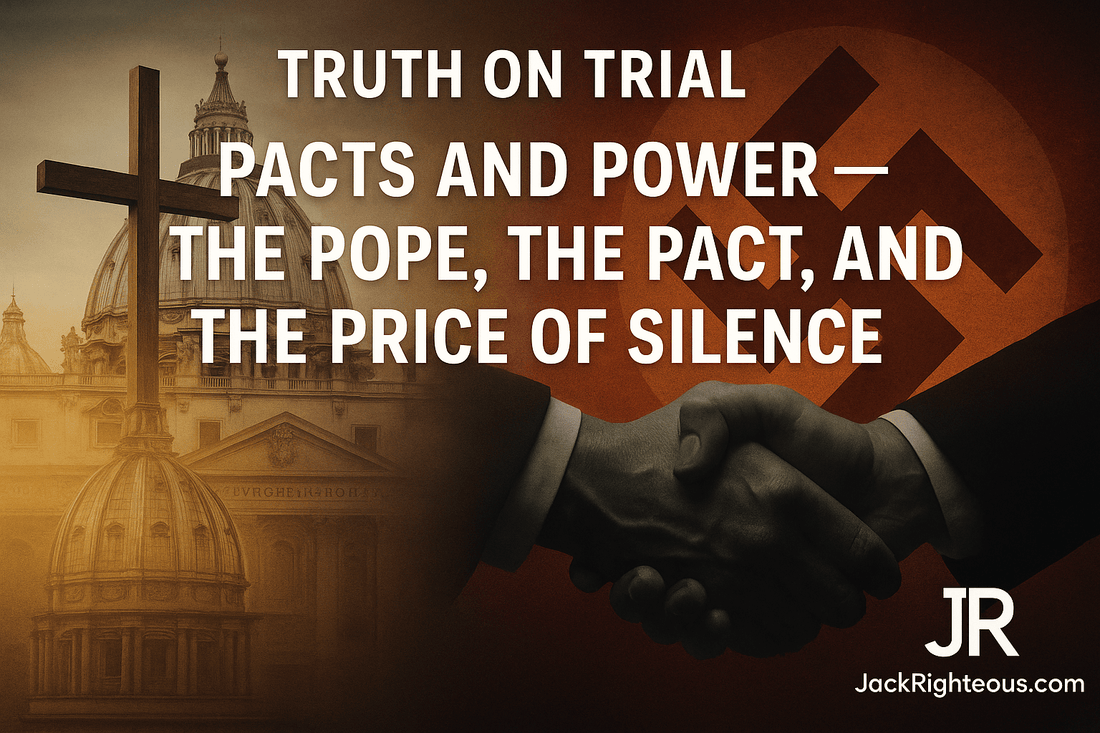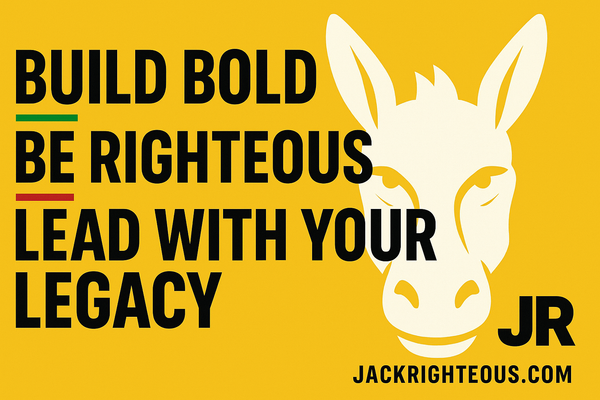
The Pope, the Pact, and the Price of Silence | Jack Righteous
Gary Whittaker
Truth on Trial: Pacts and Power — The Pope, the Pact, and the Price of Silence
Part 4 of 7 in the “Truth on Trial” Series from JackRighteous.com
When the Church Chose Caesar
In 1933, Adolf Hitler was still consolidating power. The world was watching. And so was the Vatican.
That same year, the Roman Catholic Church signed a formal agreement with the Nazi regime known as the Reichskonkordat. It was a treaty between the Holy See and the German Reich, negotiated by then–Cardinal Secretary of State Eugenio Pacelli—later known as Pope Pius XII.
Under the agreement, the Church would maintain its authority over education, associations, and worship—as long as it stayed out of politics. What followed was not just religious neutrality. It was moral surrender.
- Silence in the face of rising antisemitism
- Silence as books burned
- Silence as priests were arrested and neighbors disappeared
“A silence that became complicity. A neutrality that became endorsement.”
— Historian Saul Friedländer
The Cost of the Concordat
Signing the Reichskonkordat:
- Legitimized Hitler’s regime internationally
- Discouraged clergy from criticizing Nazi policy
- Undermined Catholic resistance movements
- Was used by Nazi officials to weaken public opposition
While some clergy defied this silence—like Father Bernhard Lichtenberg, who was arrested for praying publicly for Jewish victims—institutional Catholicism held its tongue.
Why? Because the Church chose stability. Influence. Survival. It kept its access to power—by forfeiting its witness to truth.
Pacelli’s Legacy: The Pope Who Never Spoke
Before becoming Pope Pius XII, Eugenio Pacelli had spent years as the Vatican’s envoy to Germany. He was a legalist, a diplomat, and deeply cautious. As pontiff during World War II, he never publicly condemned the Holocaust by name. He never identified its victims. He never uttered the word “Jewish” from the chair of Saint Peter during the genocide.
“The Pope could have saved lives with his voice. Instead, he preserved the Church’s position with his silence.”
— Susan Zuccotti, Under His Very Windows
Defenders claim he worked quietly behind the scenes to help victims. Critics note that public moral leadership never came. And the world watched.
How many could have been moved to action if the Vatican had forcefully condemned the regime?
How many might have survived?
When Religion Protects Itself Instead of the Oppressed
The Reichskonkordat was not the only time the Church compromised with authoritarian power. Similar concordats were signed with Mussolini in Italy and Franco in Spain. What unites these pacts is not just theological alignment—but strategic alignment.
It’s the same playbook, repeated:
- Institutional faith prioritizing access over advocacy
- Religious leaders sacrificing truth for survival
- Silence sold as diplomacy, while injustice grows
This isn’t a Catholic problem. It’s a human problem. And it’s repeating again.
2025: A New Pact, A Familiar Silence
Today, American churches are being offered their own “Reichskonkordat”—only now, it's under a new name: Project 2025.
This political blueprint, backed by Christian nationalist networks, offers churches power in exchange for obedience.
- Influence over education standards
- Control of “family values” policies
- The ability to shape executive appointments
- Pulpits protected—as long as they fall in line
It mirrors the Vatican’s 1933 deal: Bless the regime, and the regime will protect your place in society.
But like before, the price is high:
- Silence on white supremacy
- Silence on police violence
- Silence on state cruelty toward immigrants
- Silence on Christian Zionist policy demands
- Silence on creeping authoritarianism
🔍 Project 2025 and the New Religious Bargain
Strategic faith leaders are being drafted to advance a Christian nationalist vision of governance. Their reward? Preferential treatment.In exchange, their task is simple: Preach loyalty. Bless the agenda. Stay silent when it matters most.
- Faith-based exceptions to federal rules
- Political shielding from criticism
- Access to public school systems
- Immunity for leaders tied to abuses of power
Who Will Refuse the Pact?
Not every priest bowed in 1933. Not every pastor bows in 2025.
But history is asking the same question again:
Will we speak truth when power demands our silence?
“When the Church is silent in the face of evil, it ceases to be the Church.”
— Dietrich Bonhoeffer
Where Do We Go from Here?
In Part 5 of the series, we shift from political pacts to theological corruption—examining how American slaveowners rewrote the image of Jesus to justify their empire. The version of Christ that dominates American evangelicalism today isn’t just a savior. He’s a plantation owner in disguise.
And it’s time to confront him.
Stay awake.
Keep the Record Alive:
- 🔹 Share this article with someone who says “the Church shouldn’t get political”
- 🔹 Subscribe to The Righteous Beat for the rest of the series
- 🔹 Comment: Does your faith community recognize the threat of political compromise?
Continue Reading the “Truth on Trial” Series:
- Part 3: The Myth of Consensus — Not All Jews Were Zionists
- Part 5: Plantation Pulpits — Jesus in the Image of the Slaveholder

